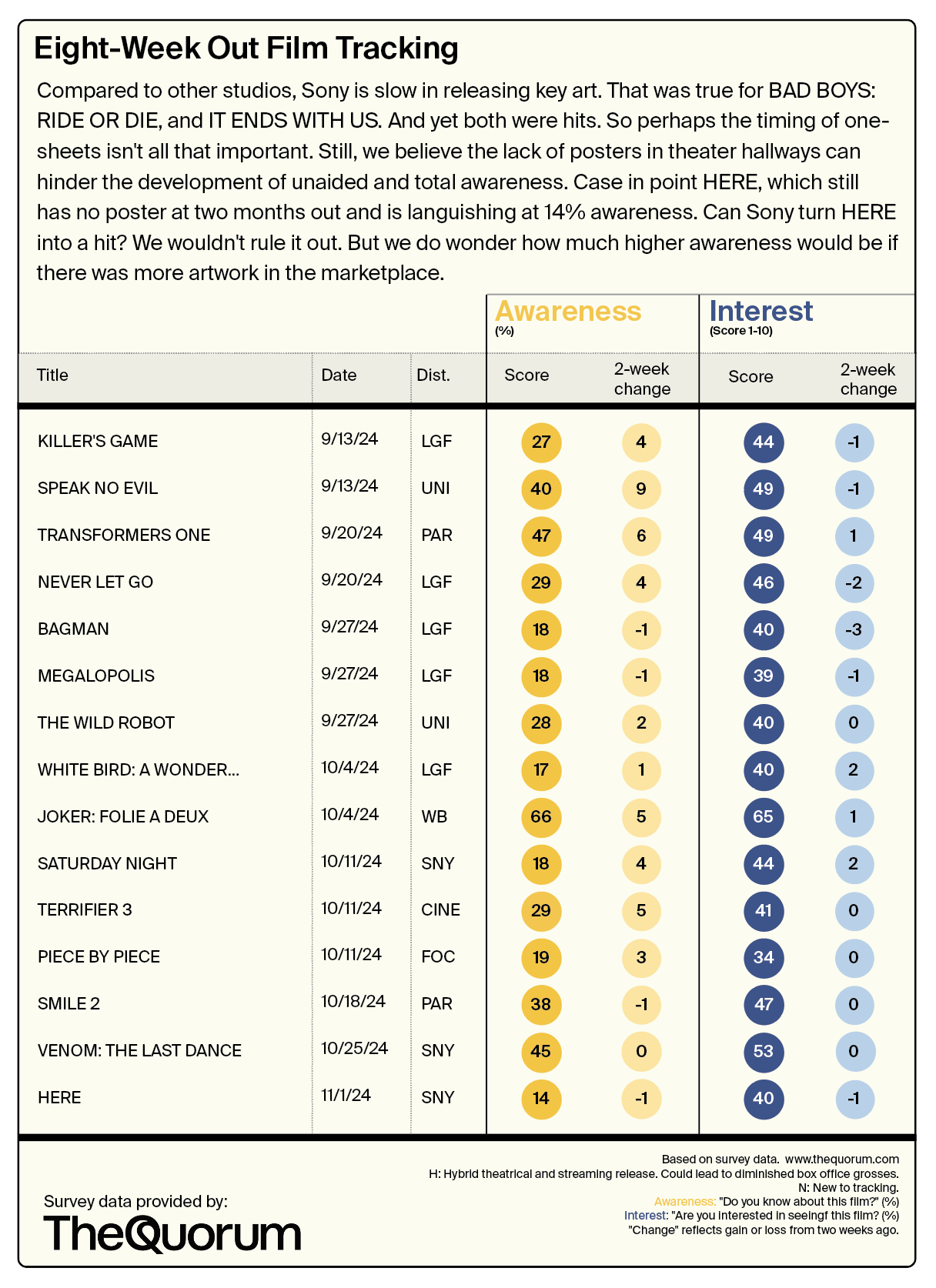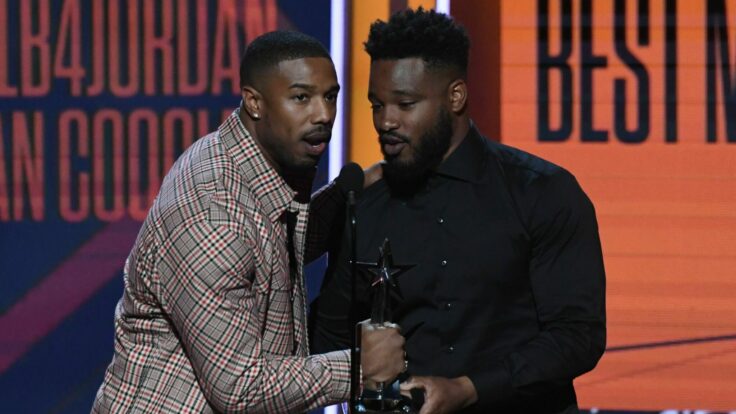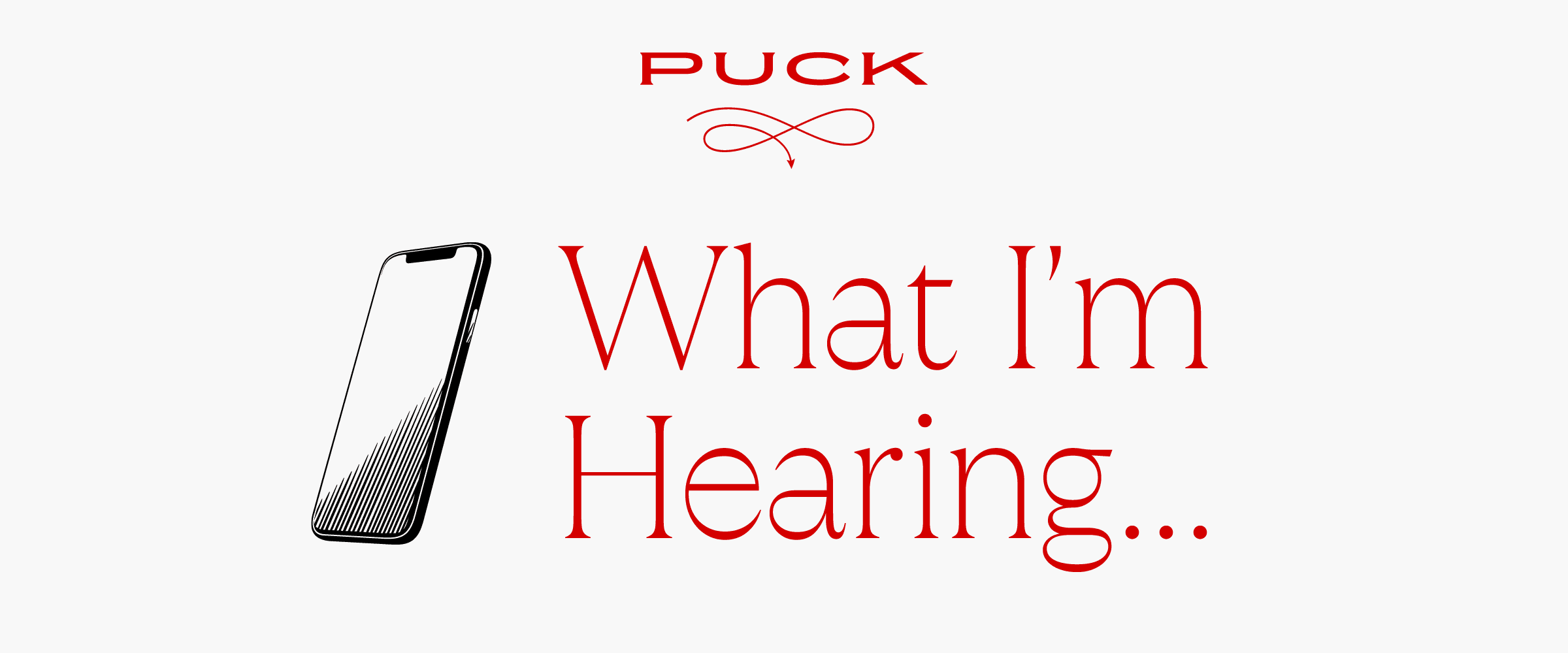 |
|
Welcome back to What I’m Hearing, coming at you between screenings at the Toronto film fest. Thanks to the filmmakers and executives who joined me for a very fun Puck private dinner last night, and big thanks to Absolutely Fabrics for sponsoring and chef Scott Roberts for the tasty food.
Programming note: On The Town, Lucas Shaw and I looked at five narratives of the fall and debated who will win the Disney-DirecTV standoff; Focus’s Peter Kujawski explained the science of picking among film festivals; analyst Steven Cahall predicted Fox Sports will join ESPN’s stand-alone streamer; and Scott Mendelson crowned a winner of the summer box office. Subscribe here and here.
Not a Puck member yet? Click here. Got a news tip or an idea for me? Just reply to this email or message me anonymously on Signal at 310-804-3198.
Discussed in this issue: Bob Iger, Brandt Joel, David Beaubaire, Ari Emanuel, Bob Chapek, Michael Keaton, Mahershala Ali, Susan Arnold, Taylor Swift, Willow Bay, Jason Reitman, Winona Ryder, Kelly Bush Novak, and… David Zaslav’s goatee.
|
Who Won the Week:
It’s a tie |
|
| Stop me if I sound like her agent, but Selena Gomez was crowned a billionaire by Bloomberg the same week her new movie, Emilia Perez, solidified its Oscar frontrunner status at TIFF, and her show, Only Murders in the Building, debuted its fourth hit season before heading to Sunday’s Emmys with 21 nominations.
And…
Hard to believe, but Tim Burton scored a $111 million domestic opening for a sequel to a 36-year-old cult classic. Beetlejuice Beetlejuice is a pretty impressive flex for Burton and his Wednesday writing collaborators Alfred Gough and Miles Millar. Let’s see if Warners can wring out similar success internationally, or if this will be another Twisters situation. (Scott Mendelson has more on this below…)
|
|
|
A few random items as I try to make this screening in Toronto…
- Sensitivity training and docked pay for WME’s ‘kill all’ agent: I’m told that two-time Oscar winner Mahershala Ali fired WME today in response to agent Brandt Joel posting “Screw the left kill all” to a company WhatsApp group after the recent murder of six Israeli hostages. Given how quickly Ari Emanuel & Co. swooped in on CAA clients like Aaron Sorkin after its rival agency’s Maha Dakhil referred, on Instagram, to Israel’s response to the October 7 attack as “genocide,” WME has to punish Joel, right? He isn’t an agency leader like Dakhil, who was temporarily demoted before being reinstated and promoted, and Joel hasn’t traded professionally on a social justice platform, as Dakhil did before her incident. But advocating violence against Palestinians is inexcusable, even in a semi-private space. WME declined to comment, but I’m told Joel is being sent to sensitivity training and, as I suspected last week, will have his pay/bonus reduced as punishment for the offense caused and the horrible optics. (Usual disclaimer: WME reps Puck but not me personally.)
- Why did Sony take ‘Saturday Night’ to Telluride?: Jason Reitman’s SNL movie is super crowd-pleasing and probably could have won the coveted audience award at TIFF, a festival the Reitman family has helped bankroll. (It still could, I guess.) But instead, the film debuted for the snobs at Telluride, where it got good but not great reviews, and was thus relegated to a Tuesday night in Toronto. Amazon made this mistake last year, taking Saltburn to Telluride, which pretty much ended its broad awards run. It had much better success with American Fiction, another more populist film that smartly resisted Venice and Telluride and debuted at TIFF, winning the audience award on the way to a best picture nom.
- Is the TIFF Globes party back?: Yes, that was Kelly Bush Novak, publicist and chief advocate of the Great Golden Globes Boycott of 2021-22, holding court at the Globes’ hard relaunch of its once-dominant TIFF party on Saturday. It was a more muted affair, nothing like the old days, where stars lined up to air kiss and pose for selfies with as many HFPA members as possible. (I once witnessed Renée Zellweger power through like a Terminator: about 20 separate 10-minute schmooze sessions with voters on her way to a Globe best actress win for Judy.) J.Lo, Sydney Sweeney, Demi Moore, Andrew Garfield, and Ana de Armas showed up, but this was hardly the must-attend event of the weekend. And only Globes co-owner Jay Penske’s Robb Report and the venue, the Four Seasons, were listed as sponsors on the step-and-repeat. So… it’s kinda back?
|
|
A MESSAGE FROM OUR SPONSOR
|
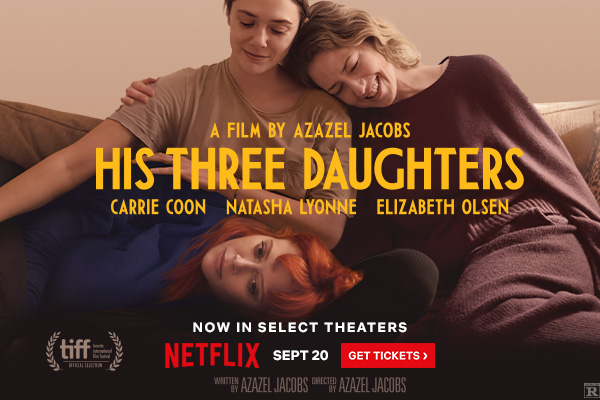 |
|
Natasha Lyonne, Elizabeth Olsen, and Carrie Coon star in this captivating portrait of family dynamics. Three estranged sisters converge in a New York apartment to care for their ailing father and try to mend their own broken relationship with one another.
From Writer-Director Azazel Jacobs
HIS THREE DAUGHTERS
NOW PLAYING in select theaters and on Netflix September 20
WATCH THE TRAILER & GET TICKETS
–
“A truly special movie. Carrie Coon, Elizabeth Olsen
and Natasha Lyonne astound.”
-HuffPost
“Masterful. Poignant and captivating.”
-Variety
“Vividly affecting. A trio of superlative turns from Carrie Coon,
Elizabeth Olsen and Natasha Lyonne.”
-The Hollywood Reporter
–
For more information on His Three Daughters, visit HisThreeDaughtersFilm.com
|
|
|
| Quote of the Week (Disney’s Botched Succession Edition) |
|
Let’s rank the cattiest reconstructed quotes from the Times’ very embarrassing 13,000-word Bob vs. Bob opus (cue the “When You Wish Upon a Star” background music)…
- “You’ve cut my legs out from under me. I’ve never felt worse in my life.” —Bob Chapek to Bob Iger, after Iger emailed the Times in April 2020 to say he was asserting more control at Disney during the Covid crisis. The heated phone conversation essentially ended the Bobs’ relationship.
- “I can’t survive another two years of this.” —Chapek, again, complaining to his chief of staff about Iger, whom he believed (presciently, as it turned out) was “not going to leave. He’ll be here until he dies.”
- “Did you see my new yacht design?” —Iger, regaling Chapek with iPad photos of his glamorous life while traveling on the Disney jet to a key shareholder meeting, causing Chapek to become “flustered” and move to the rear of the plane.
- “He doesn’t want to be prepped. He says the book is enough.” —Iger, on that same PJ ride, incredulously telling colleagues that Chapek refused help with his big introduction. This moment, according to the Times, is when Iger realized he’d made a huge mistake anointing Chapek.
- “What will be left of my reputation?” —Chapek, pleading with Disney chair Susan Arnold to be elevated to the board as a sign of confidence after Iger kneecapped him in the Times.
|
| Bonus Willow Bay snub: “Tom Schumacher, it’s been too long. I can’t believe you came all this way. Hi, Bob. I see you all the time.” —Bay, Iger’s wife, brushing off Chapek at Iger’s going-away party, where Chapek was seated at the table furthest from the Igers and referenced in speeches only when Iger mentioned that buddy Al Michaels once announced dirt track racing in rural Indiana. “That’s your area, isn’t it, Bob? You’d know all about dirt tracks.” Happiest Place on Earth, indeed! |
| Shocker: Originality Leads to Franchises |
|
I got some great feedback (below) on Thursday’s column discussing the sorry state of the original development pipeline and producer/former exec David Beaubaire’s research into the provenance of (almost) every movie from the big studios and streamers between 2022 and 2026. Furthering the argument that originality breeds long-term health, Beaubaire also looked at the 124 live-action franchises with at least three installments or planned installments between 2000 and 2026. According to his research, of the 104 franchises with a sequel or planned sequel in ’22-’26, the majority were follow-ups to prior original films or book adaptations. Here’s the breakdown:
- 52 percent: Original script or idea
- 13 percent: Book or literary materials
- 23 percent: Comic book or graphic novel
- 7 percent: Television series
- 5 percent: Toy/game
|
| That means more than 60 percent of the films with a recent sequel started as either an original or a book adaptation. Something for film executives to consider before passing on that great spec script. |
|
|
|
|
| Just like with the Sony hack, the Journal is being super aggressive about using stolen information in its reporting on Disney while other outlets aren’t. This time it’s Disney+ and park pricing data. [WSJ]
Billboard chart manipulation is nothing new, but it’s fun to see how Taylor Swift has strategically blocked Billie Eilish and Zach Bryan from opening at No. 1. [Bloomberg]
Someone tell Time, which just put Scarlett Johansson on its “100 Most Influential People in Artificial Intelligence” cover, that her legal threat against OpenAI was a garden-variety right-of-publicity claim that had little to do with the A.I. technology itself. [Time]
Netflix’s Prince documentary from Ezra Edelman seems no closer to a release now than when I broke news of the standoff in July. Hence, this very detailed story about the effort to get fans to pressure the estate. [NY Times]
The insane story of Scott and Diana Anderson, booted from Disneyland’s Club 33 for alleged public drunkenness and now spending hundreds of thousands of dollars on litigation to be reinstated: “I’ll sell a kidney,” Diana said. “I don’t care.” Like I said, Happiest Place on Earth. [LA Times]
The Black List is expanding to novels, begging the question of who will be the first unknown writer to make the Black List for adapting something from the Black List? [NY Times]
Another sign of trouble for Byron Allen: He offloaded his Aspen property for $60 million. [WSJ]
No. 1 on Rolling Stone’s 100 best TV episodes is the Breaking Bad ep you figured, but No. 3 is from… The Leftovers? [Rolling Stone]
David Zaslav has a goatee now. Doesn’t he remember how the humanizing facial hair move backfired on Bob Chapek? [Twitter/X]
Now, Scott Mendelson’s take on Beetlejuice Beetlejuice’s outsize success…
|
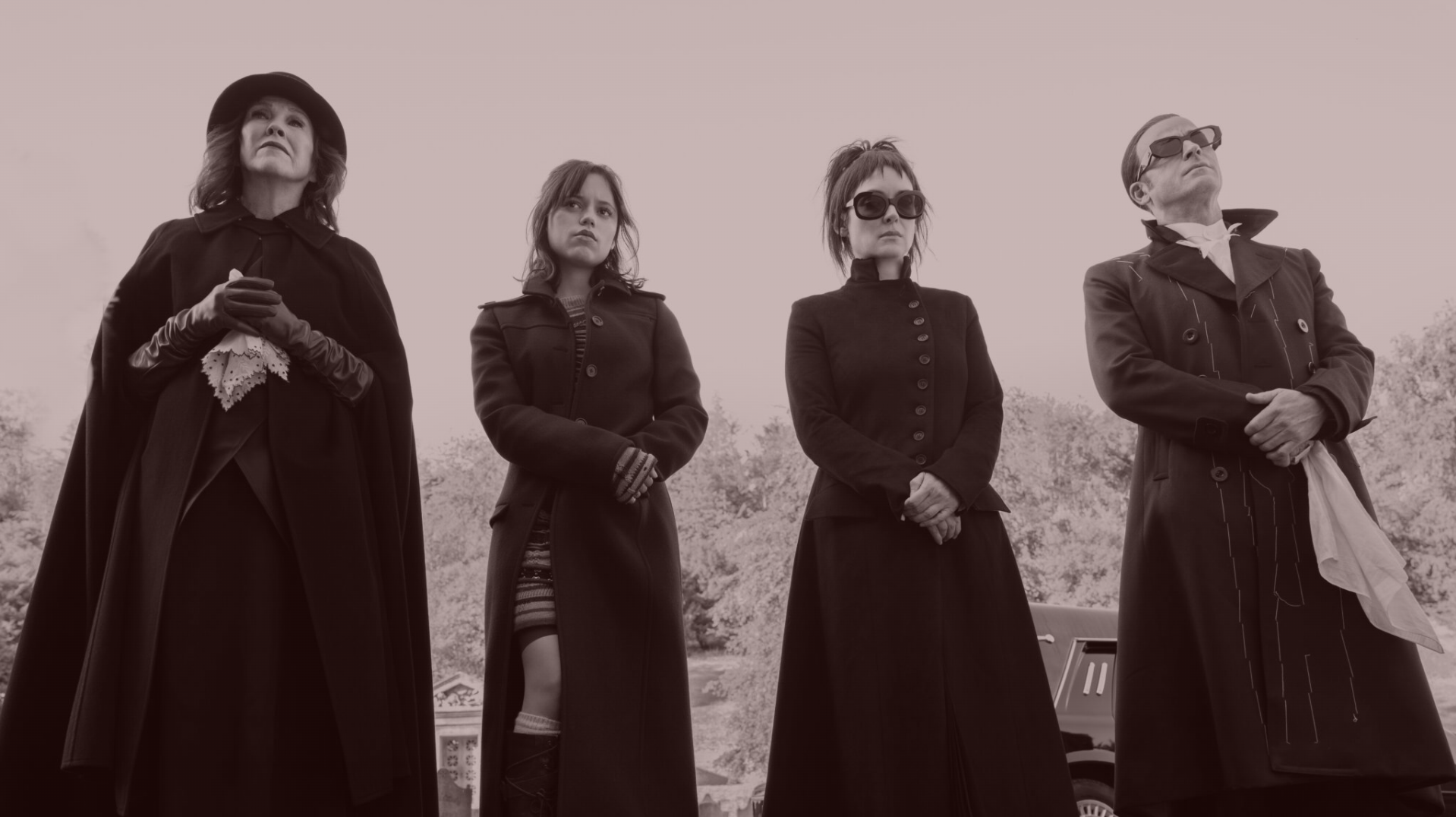 |
| The ‘Beetlejuice’ Boomerang |
| Not all legacy sequels work out, but ‘Beetlejuice Beetlejuice’ had a number of factors guiding its success—multigenerational appeal, the return of Tim Burton, and a pair of stars who are nearly as relevant now as they were more than 30 years ago. |
|
|
|
| The adults who turned up in costume for this weekend’s release of Beetlejuice Beetlejuice weren’t the whole story, much to Warner Bros.’s relief. Instead, the younger audiences, who came via Wednesday or Stranger Things, pushed the domestic box office to $111 million, making the Tim Burton sequel the latest successful example of a multigenerational nostalgia event film. Twenty-four percent of the moviegoers were under 25 years old. As a result, Beetlejuice Beetlejuice offers a solid lesson in leveraging older I.P. for a new generation and not just catering to a nostalgic fan base.
At this point, one could probably write at least a book chapter on the history of multigenerational fandom successes. In March 2017, Disney’s live-action Beauty and the Beast appealed to fans of the 1991 animated original and younger Harry Potter fans who wanted to see Emma Watson as Belle. In September 2017, on this very weekend no less, Warner Bros.’s two-part film adaptation of It capitalized on fans of the epic Stephen King novel and the buzzy-in-its-day 1990 ABC miniseries (starring a kid-traumatizing Tim Curry as Pennywise) while also playing to newer and younger fans of Stranger Things. Likewise, Star Wars: The Force Awakens sold itself as a must-see theatrical event to historic Star Wars trilogy fans and younger audiences introduced to the far-far-away galaxy via the prequels and the long-running Clone Wars cartoon. More recently, Paramount’s Mean Girls remake, actually a film adaptation of the stage play, appealed to fans of the 2004 comedy and the 2014 Broadway musical. Wonka, Top Gun: Maverick, Bad Boys for Life, and Twisters were also able to seduce nostalgics and newbies alike.
But Beetlejuice Beetlejuice represents a slightly different phenomenon. The I.P. has a fandom that has expanded and grown slowly and steadily—and across various age groups—since the release of the 1988 theatrical comedy. Beetlejuice: The Animated Series, which premiered 35 years ago today, ran for 83 episodes from 1989 to 1991. It offered many of the same ghoulish gags in a more G-rated incarnation and thus grew its own entry-point fan base. Meanwhile, in 1998, Beetlejuice (the movie) became the first DVD ever mailed out by Netflix. Since the stage musical adaptation debuted in 2018, that variation has introduced or reintroduced the property to numerous generations. And it doesn’t hurt that Burton has been a marquee filmmaker for nearly 40 years and one of Gen X’s favored auteurs, with multiple generations “discovering” him in the 1980s (via the likes of Batman or Beetlejuice) and 1990s (Batman Returns, Sleepy Hollow, Edward Scissorhands) or later on via (for example) Disney’s $1 billion-grossing Alice in Wonderland in 2010 or Netflix’s 2022 Wednesday series.
|
|
|
| The return of Burton differentiated Beetlejuice Beetlejuice from, say, Indiana Jones and the Dial of Destiny, which James Mangold directed in place of Spielberg. Also, the film’s original stars are arguably more relevant than they were decades ago. Winona Ryder, of course, was the female lead in both of Burton’s outright original features and a pop culture icon thanks to her Burton flicks and late 1980s/early 1990s Goth girl/teen angst classics like Welcome Home, Roxy Carmichael; Heathers; and Mermaids. Casting her as the matriarch in Netflix’s ’80s-set Stranger Things initially targeted audiences old enough to have idolized her generations ago, but the show’s popularity also gave her a new generation of fans. Michael Keaton, of course, is riding his own decade-long resurgence.
Likewise, Burton surrounded his stars with complementary talent. Keaton and Ryder recently joked that Burton and friends had to wait to make the long-gestating Beetlejuice sequel until Jenna Ortega had been born—and commercially speaking, she was the ace in the hole. Thanks to both a handful of high-profile horror movie roles (among them X, Scream, and The Babysitter: Killer Queen) and her headlining role on Wednesday (which has a massive youthful fan base disconnected from prior Addams Family comics, movies, or shows), Ortega has become a Gen Z star or at least (in the right project) an added-value element. Catherine O’Hara’s increased popularity via Schitt’s Creek was also a boon.
On their own, none of these elements would have elevated the film to such a successful opening weekend. Combined, however, they touched nearly every moviegoing demographic in North America. In the end, Beetlejuice Beetlejuice became that rare bird: an under-two-hour, kid-friendly, parent-safe, crowd-pleasing horror-comedy that arrived amid a relative drought in all-ages, PG-13 franchise flicks. After Godzilla x Kong in late March and Twisters in mid-July, Beetlejuice Beetlejuice has September to itself, and, presumably, a robust Halloween costume business ahead of it.
|
|
|
| As I mentioned, great comments on Thursday’s development column. Some examples…
“The skill of development is dying among the new generation [of film executives]. There was a time you’d be rewarded for using your gut instinct to develop something out of nothing. You’d earn the right to call the shots based on that gut instinct; that’s how you developed a career and rose up the ranks. But that doesn’t happen anymore. If a junior or mid-level exec does develop an original hit today, it doesn’t benefit their career much in terms of latitude. This is largely because almost every studio has focused all the power on one key decision maker at the top tasked with micromanaging every commitment at its inception. This is anathema to a good development slate.” —A producer
“Studios have been fully aware that development no longer works for them and it’s an overall huge waste of money. I can’t tell you how many times studio execs have complained about how long it takes to get drafts of scripts. I’ve heard numerous stories about giving script notes and sometimes taking two years for the writer to turn them around. And that’s if they ever do. Don’t have time to read the third draft of some project? Why are you assuming the third draft was ever delivered? The expensive and wasteful development process has driven studios to focus on packages because the old-fashioned process you outlined no longer works in today’s Hollywood.” —An agent
“It’s hardly a secret that the V.P., S.V.P., and E.V.P. jobs at studios have become crossing guard jobs at best. They no longer develop and package and exist in the filmmaking trenches. They field incoming calls from hustling producers who do that job, and then they put a project in front of their bosses and hope for the best, trying not to get fired.” —Another producer
“To be fair, even if the movie is based on I.P., it still takes good development skills and smart packaging to make the movie successful. It’s not like I.P.-driven movies just magically make themselves. Takes just as much effort as a pure original to make them actually good.” —An executive
“The reason studios and others have given up on [development] is because it requires long-term training and love of artistic practice that few people value. Better to buy the latest screenwriting manual and use it as a reference guide. Or just hope that the writer/creator can translate the note ‘Make the lead character more surprisingly familiar,’ into something valuable that improves the script. Not to mention the fact that the pipeline that most development execs travel now begins as an assistant on a desk in an agency, then moves to a C.E. position at a production company, followed by a jump into an official development job at a studio or streamer, all the while reading a ton of scripts and giving notes even though all they have in terms of experience is what they have consumed. They haven’t made a thing, and yet they are empowered to weigh in. Would you trust your car repair to an auto shop that advertised, ‘We have been reading a ton about carburetors lately, so we’re pretty sure we can fix yours!’ And yet, this is standard Hollywood operating procedure.” —A writer-producer
|
|
|
| Sony has a lot of work to do to sell Here, Robert Zemeckis’s reunion with Forrest Gump stars Tom Hanks and Robin Wright, which suffers from low interest and awareness on The Quorum’s latest early tracking chart… |
|
|
Have a great week,
Matt
Got a question, comment, complaint, or recs for a fun NYC bar to watch tomorrow’s debate? Email me at Matt@puck.news or call/text me at 310-804-3198.
|
|
|
|
| FOUR STORIES WE’RE TALKING ABOUT |
 |
| CNN’s New Blood |
| On the machinations of the network’s newish brain trust. |
| On the machinations of the network’s newish brain trust. |
|
 |
|
 |
|
 |
|
|
|
|
|
 |
|
|
|
Need help? Review our FAQs
page or contact
us for assistance. For brand partnerships, email ads@puck.news.
|
|
You received this email because you signed up to receive emails from Puck, or as part of your Puck account associated with . To stop receiving this newsletter and/or manage all your email preferences, click here.
|
|
Puck is published by Heat Media LLC. 227 W 17th St New York, NY 10011.
|
|
|
|





